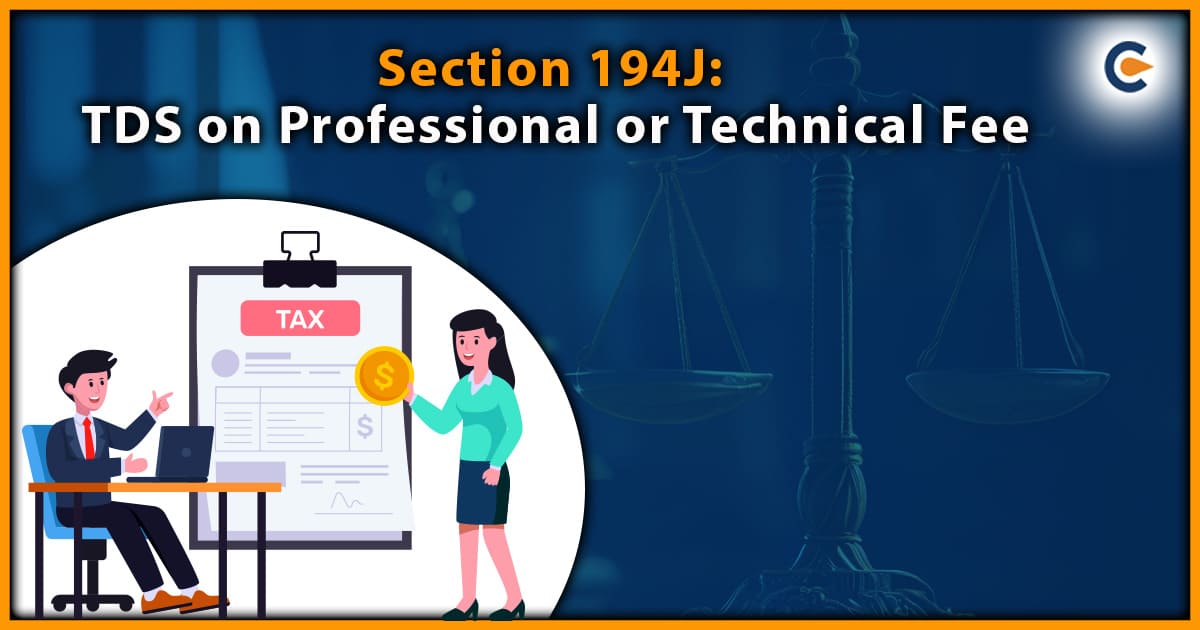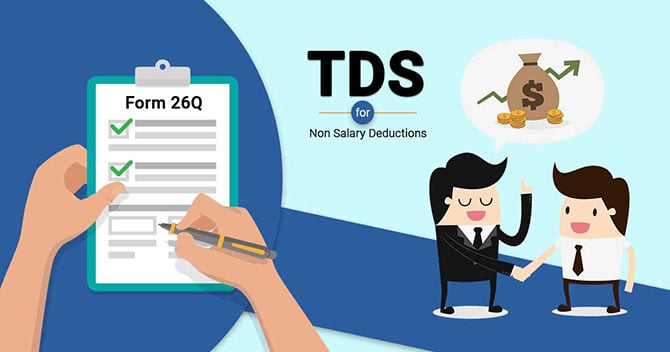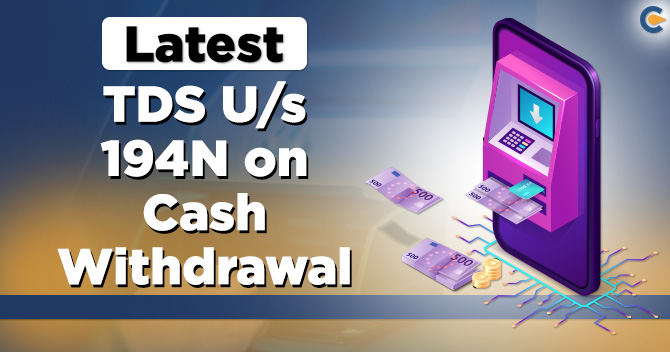Section 194J of the Income Tax Act, 1961, is a provision that deals with the deduction of tax at source (TDS) on payments made towards professional or technical services. It requires the payer to deduct a certain percentage of the payment as tax and remit it to the government on behalf of the service provider. The purpose of Section 194J is to ensure that taxes on professional or technical fees are collected at the time of payment rather than relying solely on the service provider’s self-assessment and payment of taxes. By implementing TDS under this section, the government aims to prevent tax evasion, promote transparency, and facilitate the efficient collection of taxes.
This provision applies to a wide range of services, including but not limited to legal, medical, engineering, architectural, accounting, and consultancy services. It covers payments made in the form of fees, royalties, commissions, or any other consideration for such services.
The person responsible for making the payment is required to deduct TDS at the applicable rate specified under Section 194J. The current rate for TDS on professional or technical fees is 10%, although it increases to 20% if the recipient does not provide a valid Permanent Account Number (PAN). It’s important to note that Section 194J includes certain exemptions and exceptions. For example, payments made to the government, institutions notified by the government, or specified entities engaged in scientific research may be exempt from TDS under this section. Additionally, if the services are rendered outside India and the income is not effectively connected with the Indian business, TDS may not be applicable.
Compliance with Section 194J is crucial for both the payer and the service provider. The payer must ensure proper deduction and remittance of TDS within the prescribed time frames. Failure to comply with the provisions of this section may attract penalties, interest, and even prosecution proceedings.
Scope of Section 194J
Section 194J of the Income Tax Act of 1961 has a broad scope and encompasses a wide range of professional or technical services. It applies to payments made in various forms, including fees, royalties, commissions, or any other consideration, for availing of these services. Understanding the scope of Section 194J is crucial for both the payer and the service provider to determine if TDS is applicable.
The services covered under the scope of Section 194J include, but are not limited to:
- Legal Services: Payments made to lawyers, solicitors, or legal firms for legal advice, representation, or other legal services fall under the purview of this section.
- Medical Services: Payments made to doctors, surgeons, hospitals, clinics, or other medical professionals for medical consultation, treatment, or healthcare services are covered by Section 194J.
- Technical Services: This includes payments made to engineers, architects, technicians, or other professionals involved in providing technical expertise, project management, or technical support.
- Consultancy Services: Payments made for professional consultancy services in fields such as management, finance, human resources, marketing, or any other specialized area come under the scope of this section.
- Accounting and Auditing Services: Payments made to chartered accountants, auditors, accounting firms, or professionals providing accounting, auditing, or bookkeeping services are subject to TDS under Section 194J.
- IT and Software Services: Payments made to IT consultants, software developers, programmers, or professionals engaged in providing IT or software-related services fall within the purview of this section.
- Advertising and Marketing Services: Payments made to advertising agencies, marketing consultants, or professionals offering advertising, marketing, or promotional services are covered by Section 194J.
- Research and Development Services: Payments made to research institutions, scientists, or professionals engaged in scientific research and development activities are included in the scope of this section.
It’s important to note that the services mentioned above are only illustrative, and the scope of Section 194J is not limited to these examples. The key criterion for applicability is that the payment should be made for professional or technical services provided by individuals, partnerships, or companies. Section 194J applies to a wide range of professional or technical services covering various sectors and industries. It is essential for both the payer and the service provider to understand the scope of this section to determine if TDS needs to be deducted on the payments made for such services.
Applicability and Rates of TDS under Section 194J
Section 194J of the Income Tax Act, 1961, mandates the deduction of tax at source (TDS) on payments made towards professional or technical services. Understanding the applicability and rates of TDS under Section 194J is crucial for both the payer and the service provider to ensure compliance with the tax regulations.
Applicability:
Section 194J applies when the following conditions are met:
- Nature of Payment: The payment should be made for professional or technical services. This includes services provided by individuals, partnerships, or companies in various fields, such as legal, medical, engineering, architectural, accounting, consultancy, and more.
- Threshold Limit: TDS under Section 194J is applicable when the total professional fees paid or credited during the financial year exceed Rs. 30,000. However, once this threshold is crossed, TDS should be deducted on the entire amount, including the initial payments.
Rates of TDS:
The applicable rate of TDS under Section 194J for professional or technical fees is 10%. This means that the payer is required to deduct 10% of the payment as TDS and remit it to the government. The service provider can give the remaining 90% of the payment.
However, if the recipient of the payment does not provide a valid Permanent Account Number (PAN), the TDS rate increases to 20%. It is essential for the payer to ensure that the service provider’s PAN is provided and correctly quoted to avoid a higher TDS rate.
It’s important to note that the TDS amount deducted by the payer is a liability on the part of the service provider and not an additional tax. The service provider can claim the TDS amount as a credit while filing their income tax return, thereby reducing their overall tax liability.
Compliance with the rates of TDS under Section 194J is essential to fulfill the tax obligations and avoid penalties or consequences for non-compliance. Section 194J requires the deduction of TDS at the rate of 10% on payments made for professional or technical services, subject to the threshold limit. Payers need to ensure timely and accurate deduction of TDS, while service providers can claim the TDS amount as a credit during their income tax filing. Understanding the applicability and rates of TDS under Section 194J is crucial for both parties involved in the transaction.
Exceptions and Exemptions under Section 194J
While Section 194J of the Income Tax Act, 1961, mandates the deduction of tax at source (TDS) on payments made towards professional or technical services, there are certain exceptions and exemptions where TDS may not be applicable. It is important for both the payer and the service provider to be aware of these exceptions and exemptions to ensure compliance with the tax regulations. Here are some key exceptions and exemptions under Section 194J:
1. Government Payments: TDS under Section 194J is not applicable on payments made to the government. If the payment is made directly to a government department or entity, TDS is not required to be deducted.
2. Institutions Notified By The Government: Certain institutions notified by the government, such as universities, educational institutions, hospitals, etc., may be exempt from TDS under Section 194J. However, it is important to verify if the specific institution falls within the notified list to claim this exemption.
3. Specified Scientific Research Institutions: Payments made to specified scientific research institutions may be exempt from TDS under Section 194J. These institutions are engaged in scientific research and development activities and have been granted exemption from TDS by the government.
4. Non-Applicability For Income Not Effectively Connected With Indian Business: If the professional or technical services are rendered outside India, and the income earned is not effectively connected with the payer’s Indian business, TDS under Section 194J may not be applicable. This exemption applies when the income is not taxable in India.
It is important to note that even if an exception or exemption is applicable, proper documentation and evidence must be maintained to support the claim. Additionally, the service provider may still be required to report the income and comply with other tax regulations.
It is advisable for both the payer and the service provider to consult a tax professional or refer to the official guidance provided by the Income Tax Department to determine the specific exemptions or exceptions applicable in their case. Compliance with the exceptions and exemptions under Section 194J ensures that TDS is correctly applied, and the tax liability is appropriately met. It also helps to avoid unnecessary deductions and streamline the tax process for eligible cases.
Compliance and Consequences of Non-Compliance
Compliance with the provisions of Section 194J of the Income Tax Act, 1961, is crucial for both the payer and the service provider to fulfil their tax obligations and avoid any legal or financial repercussions. Failure to comply with the requirements of Section 194J may attract penalties, interest, and even prosecution proceedings. Here’s an overview of compliance and the consequences of non-compliance:
Compliance Responsibilities:
- Deduction of TDS: The payer is responsible for deducting the applicable TDS at the specified rate while making payments for professional or technical services under Section 194J. The TDS amount should be calculated accurately, and the payer must ensure the deduction is made at the time of payment.
- Timely Deposit: The deducted TDS amount should be deposited with the government within the prescribed timelines. The payer must use the appropriate challans and make the payment through authorized modes such as online banking or designated banks.
- Issuance of Tds Certificate: The payer is required to issue a TDS certificate to the service provider as proof of the tax deduction. This certificate, in Form 16A, should contain details such as the TDS amount, the nature of payment, and other relevant information.
Consequences of Non-Compliance:
- Penalties and Interest: Non-compliance with the provisions of Section 194J may attract penalties and interest. If the payer fails to deduct TDS or makes a lower deduction, they may be liable to pay a penalty equal to the amount of TDS that should have been deducted. Additionally, interest at the rate of 1% per month or part thereof may be levied on the amount of TDS not deducted or deposited.
- Prosecution Proceedings: In severe cases of non-compliance, the Income Tax Department may initiate prosecution proceedings against the payer. If found guilty, the payer may face imprisonment and fines as per the provisions of the Income Tax Act.
- Disallowance of Expenses: Non-compliance with TDS provisions may lead to the disallowance of the expenses claimed by the payer. The Income Tax Department has the authority to disallow the deduction of expenses related to professional or technical services if TDS is not deducted or deposited.
- Reputational Risk: Non-compliance with tax regulations can harm the reputation of the payer and may create trust issues with clients or business partners. Maintaining a good compliance record is essential to build a positive image and ensure smooth business operations.
To avoid these consequences, it is important for both the payer and the service provider to understand and comply with the provisions of Section 194J. It is advisable to seek professional guidance, maintain proper records, and timely fulfill the TDS obligations.
Conclusion
Section 194J of the Income Tax Act, 1961[1] plays a significant role in the deduction of tax at source (TDS) on professional or technical fees. It encompasses a wide range of services and requires the payer to deduct TDS at the applicable rate and remit it to the government. Understanding the provisions, applicability, rates, exceptions, and exemptions of Section 194J is crucial for both the payer and the service provider. Compliance with Section 194J ensures that taxes on professional or technical fees are appropriately collected, promoting transparency and tax compliance. Payers must deduct TDS at the specified rates and deposit it within the prescribed timelines. Service providers need to consider the impact of TDS on their income and comply with reporting requirements while filing their tax returns.
Non-compliance with the provisions of Section 194J can result in penalties, interest, and even prosecution proceedings. It may also lead to disallowance of expenses and reputational risks. Therefore, it is essential for both parties to fulfill their respective responsibilities and meet the tax obligations to avoid the consequences of non-compliance. By adhering to the provisions of Section 194J, taxpayers contribute to a fair and efficient tax administration, promote transparency in financial transactions, and ensure the smooth functioning of the taxation system.
Read our Article: Section 194J Under IT Act- All You Needs To Know











